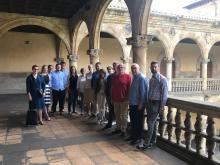Coordinators: Michał Paździora (University of Wroclaw), Michał Stambulski (University of Wroclaw)
Description of the meeting
a. Mapping: the present state of discussion about legal education in legal philosophy.
In contemporary discussion on legal education two contradictory narratives come to the fore: the orthodox and unorthodox one. First one puts emphasis on foreseeability, rationality, certainty and underlines neutrality and universality of legal tools. The second one, on the contrary, brings our attention to contextuality and inevitable discretionality of legal reasoning. In this narrative, law - similarly to the society as such - is the result of conflicts of values and incompatible interests. The orthodox narrative, which roots date back to the Enlightenment and political doctrines of liberalism, typical for Western democracies, depicts legal education as an apolitical process during which students being introduced to arcanes of legal knowledge are taught a distance necessary to assimilate with abstract and general rules of legal discourse. The aim of this process is to produce “abstract lawyer” (lawyer per se) - the imagined individual who perceives itself as transparent, rational and thoughtful. The unorthodox narrative, being inspired by social sciences and noticeably distancing itself from modernist values, is not limiting itself solely to formulating suspicions and accusations, seeing in law exclusively tools of power and establishment of hegemony. In its critique, it underlines, that the orthodox narrative mainly supports processes of forgetting that law, and legal education as such, is historically, culturally and socially mediated. A clear-cut recognition, that law is an arbitrary social construct, as B. Latour pointed out, entails quitting the game before its start.
b. Thesis
The relation between the orthodox and unorthodox narratives should not be deemed as exclusive and does not imply that one should replace the other. On the contrary, in spite of contrary character of these narratives, both might be authentic and supplementing each other. This is because of different political roles of legal education - the ultimate win of one falsifies itself. So if we look at the legal education, as a “fully-fledged” object of research rather than a simple material of research, and we approach legal education as practical activity of crucial importance, it would soon turn out that it constitutes neglected sphere of social ontology of law. We should also remember that ignored and unquestioned ontology becomes metaphysics.
Taking legal education seriously leads us to the next theoretical settlement: curriculum is not merely about what should be taught, but it encompasses action and purpose. Legal education therefore is part of social process of reproduction, in other words it is a goal-oriented process of modeling of actors ready to play its professional roles. Transmission of knowledge is inherently connected with modeling of personality, instilling hermetic ways of thinking; it is value-oriented action aiming to model perception of reality. This process aims to neutralize and therefore legitimize reality, in which future legal adepts will practice. Education however, as J. Dewey pointed out, not only aims to provide one experience freely available and useful in other experiences, a real legal education should provide means of understanding and giving meaning to what is still happening and what has to be done yet.
The preparation for legal practice not only requires some co-ordination between training centers with respect to the effectiveness, methods and utility of the training offered, in other words, some planning and designing of social roles of embodied by legal professions. Against this background we can observe two distinct educational profiles: that of a lawyer –academic (Academia) and that of a lawyer- practitioner (Practice). In our opinion there also is a third possibility: lawyers training constitutes a distinct hitherto unidentified and poorly researched element of legal discourse separate from academic knowledge and practice. Aforementioned need for co-ordination can be put into effect not only within the official (overt) curricula, but also, and above all, through the so-called hidden curricula. The notion of a hidden curriculum is based on the premise that the means of achieving the official goal of an educational process are as important as the goal itself and its justification.
c. Aims.
In the light of the mentioned problems, our workshop aims:
(1) to inspire and enhance discussion on legal education in conjunction with the role of law in society, especially touching such issues as:
• The position of political philosophy in legal education;
• Is postmodernistic legal education possible?
• What does pedagogy can bring into methodology of law teaching?
(2) to present of the basic problems of legal education against the background of political changes after 1989 and contemporary political challenges (so-called Post-Soviet, CEE and Western Democracies), especially touching such issues as:
• A role and position of legal education in transformation from authoritarianism to democracy
• comparative studies of models and methods of legal education
(3) to elaborate institutional and doctrinal strategies, which lead to better understanding of social ontology of law:
• Can we speak of Western and Central-Eastern social ontology of legal education?
• Should we focus on changes in legal curriculum?
Our experience in Oñati
I would like to warmly thank everyone involved in the organization of our event.

